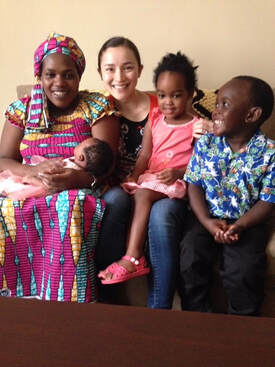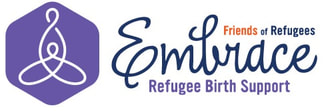 A few weeks ago, I found myself in a study month at my medical school where we received time off from clinical duties in order to study for our licensing exams. Although the study schedule is fairly intensive, we have the flexibility to decide how we will structure each day. As such, although I did not feel that my study schedule would allow me the time to be “paired” with a mom through Embrace, which entails taking a mom to all of her prenatal appointments and being present for her delivery, I figured, at the very least, I would try to help out with some one-off appointment needs. One brisk Wednesday morning, I went to meet Kawera who was nearing the end of her pregnancy. I had been told ahead of time that Kawera speaks Kinyarwanda and Swahili. By some stroke of grace, it turns out that I had studied Swahili for one year in college about a decade ago. But by a concurrent stroke of my own finitude, I realized to my great dismay and embarrassment that the only things I could remember how to say were, “Hello, how are you,” “I only speak a little Swahili,” “I don’t know,” and amusingly, “motorcycle” (“pikipiki” was just such a memorable word). When I arrived at Kawera’s home, I mustered up my best Swahili accent and greeted her with a rusty, “Hujambo! Habari gani?” She smiled and returned the greeting. Our conversation after that was fairly fragmented, filled with multiple quizzical looks and gracious smiles. We arrived at her doctor’s office and while we were waiting, we discovered that we both speak some French, too. So, we took turns attempting to say things in Swahili, then French, then English to see if by any chance the other person would understand. When it was clear the other did not understand, we turned to an online English-Swahili dictionary to help piece together what turned out to be a very pleasant conversation. When it was time for her appointment, my sense from our conversation was that she would prefer I wait outside the exam room. Of course, I understood; I would feel uncomfortable having a stranger I just met and with whom I could barely communicate sit in on my doctor’s appointment. At the end of her appointment, the doctor asked her to return in one week. Thinking I would simply relay that information to Embrace so another volunteer could take her, I jotted down the appointment information and we started on our way home. Something funny happens, though, when you get to see someone face-to-face—and I mean truly see them. When you begin to learn about that person’s life, the names of her children, and the places she has lived, you start to feel interconnected, like maybe you both have an important role to play in bringing about joy and flourishing in the other person’s life. Over the course of the next few weeks, as much as possible, I made it a priority to take her to as many of her prenatal visits as I could. After each visit, she would invite me into her home for some juice and company. I got to meet her husband and their other children, and we even sang some songs together. Although I thought I was the one working to actively welcome this refugee family, it struck me that, in fact, I was the stranger, and they had invited me in. They had invited me into the sacred process of pregnancy and birth, into their home, and into their lives. There are few higher privileges than this, and for it, I am deeply humbled and eternally grateful. Embrace Reflection by Carmen Reid
1 Comment
|
AuthorStaff, Volunteers and Mothers sharing their stories. Archives
June 2022
Categories |
Contact Us
|
|
Embrace is a program of Friends of Refugees, an organization that exists to empower refugees through opportunities that provide for their well-being, education, and employment.
Learn more at friendsofrefugees.com |
FOLLOW US ON FACEBOOK |
Proudly powered by Weebly

 RSS Feed
RSS Feed
